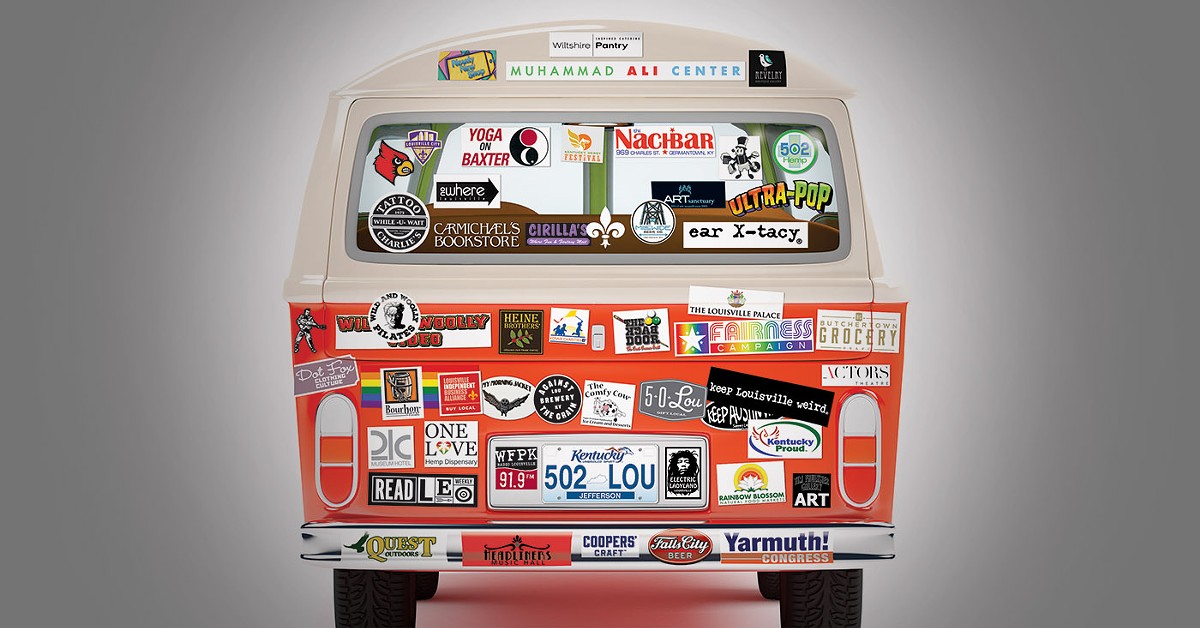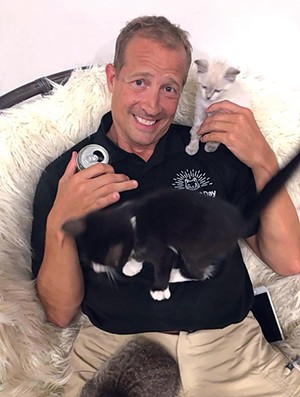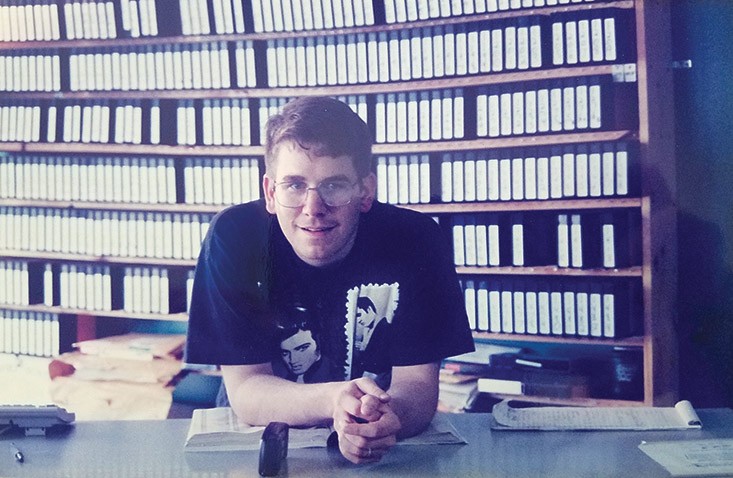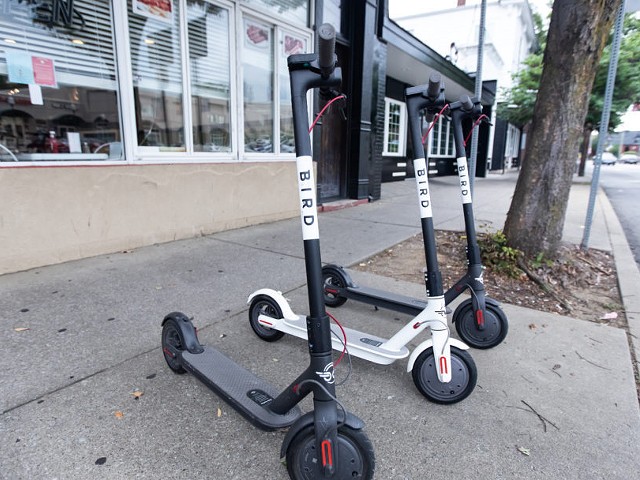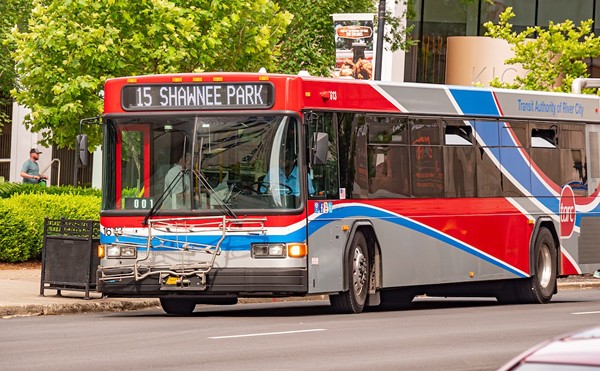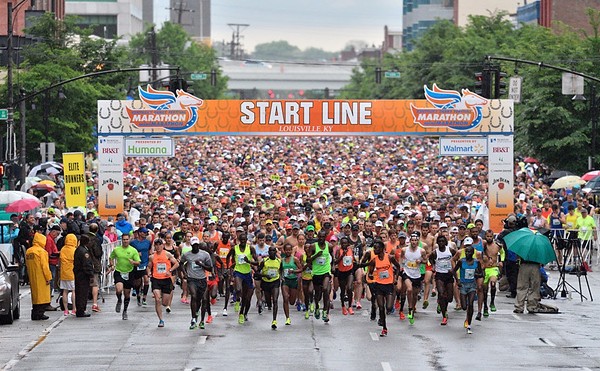It was 2004 when John Timmons returned home from a conference in Austin, Texas, armed with a new slogan: “Keep Louisville Weird.”
It would prove to be the foundation for the Louisville Independent Business alliance, or LIBA, and it would grace T-shirts, stickers, koozies and plenty more swag, and it was embraced particularly by dwellers of The Highlands. The motto was exemplified by such independent businesses as Timmons’ popular ear X-tacy records and Wild and Woolly Video, Hawley-Cooke Booksellers and others.
For his part, Timmons said, he was more concerned for other independent businesses around town, given that his music store was still doing well at the time. He simply didn’t want chain stores to invade Louisville and steal customers from them. He felt the city was still devoted to these independent businesses and wanted to create awareness to keep it that way.
Rainbow Blossom and Hawley-Cooke Booksellers are two he readily mentions, particularly because, at the time, Wild Oats and Whole Foods were headed to town to potentially siphon business from the former, and chain bookstores were threatening the latter.
“The whole buy local thing was going to happen anyway,” Timmons said. “You could see it happening nationally.”
Fifteen years later, with LIBA having blossomed to some 900 members and many once-weird locales including ear X-tacy, Wild and Woolly and WHY Louisville having gone the way of the dinosaur, it’s fair to wonder if the weirdness remains. Let’s face it, The Highlands and surrounding neighborhoods not only have head shops, quirky restaurants and tattoo parlors but also chains such as Hopcat, Walgreens and Wendy’s.
Still, plenty of other unique independent businesses have sprung up around the city to replace lost treasures that included Twice Told Coffee House, Judge Roy Bean’s, the Vogue and others. And many still fondly remember quirky places such as L&N Trains and Things on Frankfort Avenue and Lynn’s Paradise Cafe.
Many of these independent and unique businesses have survived. Leatherhead has been in business and family owned for well over 30 years, and the Doo Wop Shop, home to musical instrumental sales and rentals, has been chugging along since 1971 and has locations in Lexington and Frankfort.
The question now becomes: “Is Louisville still weird?” This question was posed to business owners from multiple eras of Louisville’s last decade and a half, but first, let’s take a look at how Louisville jumped on the weird wagon in the first place.
How The Weirdness Started
Many know that the slogan “Keep Louisville Weird” was repurposed from Austin, Texas, which at the time was in the height of its so-called weirdness, but not everyone knows that it wasn’t an official slogan adopted by the city of Austin or even by a local business alliance such as LIBA. No, it was created by a small company there called Waterloo Records.
Timmons was in Austin at a conference when he heard the slogan. Waterloo’s owner offered up the slogan to Timmons to take back to Louisville (Portland, Oregon also used “Keep Portland Weird”), and rather than try to roll it out as an open publicity campaign, Timmons bought a billboard on Bardstown Road, directly across from ear X-tacy. It was plain white on black. The slogan also was put on stickers and T-shirts and, for a time, it was a local mystery.
Even though the font was exactly the same as the one used for ear X-tacy’s logo, that rough typewriter font, the “Keep Weird” source and motivation still remained a mystery as long as Timmons didn’t speak up.
“I didn’t tell anybody what it was, what it was about,” Timmons said. “Slowly but surely, people got interested in it.”
Don Burch, owner of Quest Outdoors, an independent retailer of outdoor gear, was the first to figure out the source. As a small business owner, Burch was interested in helping to carry the torch. Other small businesses came on board, and LIBA was born.
“I get blamed for it — I get thanked for it,” Timmons deadpans when discussing the signature slogan. “Whatever.”
He has no regrets.
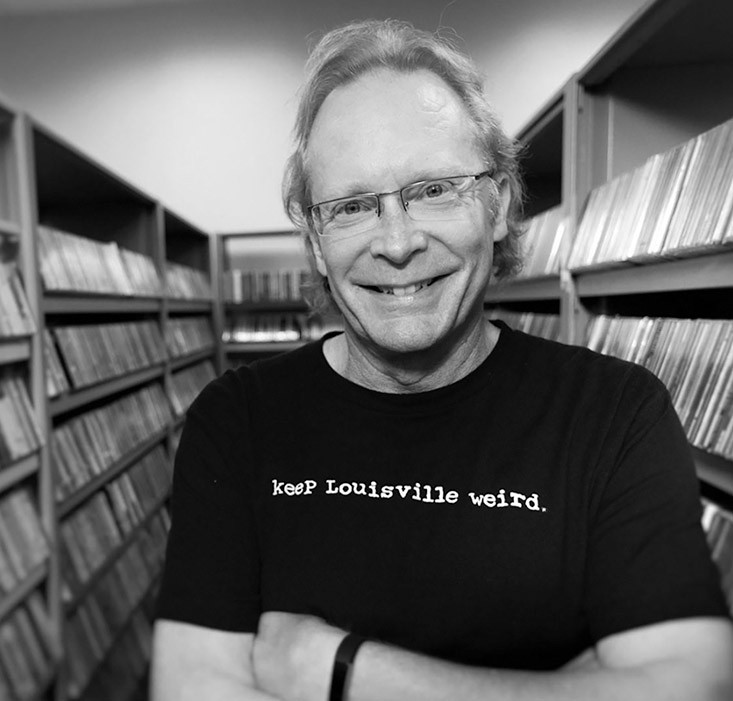
Not even when, perhaps ironically, ear X-tacy would be forced to move to a smaller location and then closed eventually. The most recent ear X-tacy is now a Panera Bread fast casual restaurant.
“I got together with the [other business owners] and said, let’s promote buying local before these other businesses come to town,” Timmons said. “It was a good time for me in the record business. I didn’t really have that competition coming until the internet and Amazon.”
Said Jennifer Rubenstein, director of LIBA, “We kind of view that as a big turning point.”
“There was a lot of response to it, largely because people were trying to figure out what it means. It still resonates with people,” she said.
But while The Highlands and surrounding neighborhoods still are home to plenty of independent businesses, arguably the highest concentration in the city, there has been no stopping the chain stores from moving in as well. It’s simple economics — the popularity of the neighborhood, in a way, became its own worst enemy, as the cost of real estate increases, rents keep going up and up and up.
“That’s kind of what we were fighting, just because I could see it,” Timmons said, noting that the first 10 years or so were reasonable in his much-loved ear X-tacy location — he now calls it “Panera X-tacy.” Once the lease was up, the rent went up. Business was down, and those two things simply don’t add up.
“That’s why the corporate businesses are coming in,” he said. “That was one of the things I was fighting against, to keep more Walgreens and other corporate stores from opening up.”
Out With The Old
Things change.
Businesses come and go.
But localists, people who patronize primarily local establishments and eschew chains, still mourn when local businesses close up shop. Nevertheless, the cycle continues.
Some do survive. One of the older remaining businesses that might fall into that “weird” category is Magnetic Tape Recorder Co. In an era when digital technology rules, it has been in business since 1956 and continues its focus of repairing vintage stereo equipment and selling new and used equipment.
Founders Gene and Hazel Dillingham no longer own the business, but it’s been in its current location at the corner of Baxter Avenue and Payne Street since 1966.
Another is Leatherhead, founded and still owned by Nick Boone and wife Lynn. The business specializes in handmade, custom leather goods, from boots to satchels to belts. As noted, Doo Wop Shop, nearly half a century in business, now has multiple locations.
And Caufield’s Novelty, located on West Main, has been in business for nearly 100 years. The family-owned seller of novelties, costumes and props recently announced it would sell the building but that the business would likely continue. If that concept doesn’t speak to a history of local weirdness, nothing does.
It’s clear why ear X-tacy is no longer around — the technology changed, and the business model went with it. The store grew from a tiny shop off Poplar Level Road, near what formerly was Lolita’s Tacos and now is Louie’s Hot Chicken & Barbecue, to a huge store that carried everything from music to T-shirts, movies, novelties and more. Streaming music and digital radio killed many such music stores.
The same is true for Wild and Woolly Video, a video rental business that was beloved by many. It was a place where, if one had the sudden urge to watch a film such as “Freaks,” the macabre classic directed by Louisville native Tod Browning, one could count on finding a copy.
Now, one can simply stream that movie and thousands of others, or even find it readily on the internet. Also, few people under the age of 65 own a VCR these days.
The founder and owner of that business was Todd Brashear, who keeps the memory of his original business alive with a Highlands establishment called Wild and Woolly Pilates. But he quickly points out that, as he puts it, “Nostalgia is tricky.”
He explained it this way: “All those businesses seem important now. But when they all opened, was anybody putting them up on a shelf like a trophy like they might now? People a lot of times were just, ‘This is weird. I don’t understand what’s going on. This is not Blockbuster.’ They were just totally confused. It was only after being in business for a long period of time that it became a classic Bardstown Road business or whatever.”
One might say that “weird” is in the eye of the beholder, in other words.
And Rubenstein noted that sometimes businesses just close because it’s time. Sometimes it isn’t economics or changing trends.
“Baby boomers are retiring,” she said. “If they’re not selling their business, they’re closing it and moving on to the next chapter of their life.”
In With The New
Even with the many fallen soldiers, 15 years later, new, independent businesses continue to open and thrive around the city. For every failed venture, such as the odd and short-lived The Cereal Box, where you were invited to eat cold cereal and cereal-based treats, there’s a Purrfect Day Cat Café, one of two cat cafes in the city along with Lucky Cat Café and Lounge.
Purrfect Day owner Chuck Patton believes the key to his business, or any independent business, is to provide not just a product or service but an experience. At Purrfect Day, you can have a coffee or a cocktail and, if you want, pay by the half hour to hang out in a lounge area inhabited by adoptable kittens and cats.
Patton had sold his previous business, a marketing company, and he was wondering what to do next when he happened to be in Charleston, South Carolina and saw a sign that read, “Lap Dances, $15.” No, it wasn’t a strip club, but a cat café. The idea intrigued him as a possibility for Louisville.
So, he pounced.
He ran aground on several attempts when landlords would decline to rent their properties for such a venture. But he finally found a landlord who was amenable. Purrfect Day opened during the summer and, in just under four months, has adopted out more than 1,800 cats and kittens, all of which came through the Kentucky Humane Society.
The adoption rate is the highest in the U.S. among such businesses, Patton said.
“To me,” he said, “this is a testament to the community.”
Weird is as weird does, apparently. Think about the concepts that have opened in the last couple of years: Flying Axes, where people can go to drink beer and hurl axes at targets. There’s Smash Time and the Smash Lab, where you can arm yourself with hammers and bats and beat the crap out of inanimate objects.
On the tamer side, there’s Weightless Float Center, a concept where customers enjoy a form of therapy that involves floating in a special water tank. There’s Louisville Silent Disco, which rents equipment to facilitate dance parties in which attendees listen to music of their choice through headphones. In other words, if a DJ at a standard club plays a song you hate, you don’t have to sit one out — you control the playlist.
So, essentially, while it’s easy enough in Louisville to go out to dinner at The Cheesecake Factory and then to an AMC cinema complex for a movie on date night, it’s just as easy to hit a cat cafe for a cocktail, then have dinner at Noche Mexican BBQ, a Dia de los Muertos-themed restaurant and then go throw axes.
Hard to compare the two evenings.
Set to open later this year is PG&J’s Dog Bar, a combination cocktail lounge and dog park. The concept is based on similar businesses around the country, and this one, incidentally, is based on a specific dog bar in Austin, Texas, which sort of brings the “Keep Louisville Weird” backstory full circle. So, the dog lovers will have their spot too.
And while many of the 900 LIBA members are basic businesses such as banks or liquor stores, Rubenstein said, the list nevertheless represents Louisville’s uniqueness, with businesses including “everything from diapers to dumpsters.”
Yes, that’s right: One member business is The Diaper Fairy, a diaper delivery and cleaning service with a goal to cut the estimated environmentally unfriendly, 27.4 billion disposable diapers used annually in the U.S.
The Verdict
Yet the question remains: Is Louisville still weird?
Was it ever?
“Yes,” Rubenstein said without hesitation. “We embrace our weirdness. These businesses are sticking around. Everything changes and adapts and finds its niche.”
Wild and Woolly’s Brashear isn’t quite so sure: “It depends on what your definition of weird is. If it means just those businesses, then no, it’s not weird.”
But if the term encompasses the entire population, including the people who patronize independent businesses, he agreed Louisville definitely has a weird side. As he points out, places such as Electric Ladyland don’t last for decades by accident.
At the same time, the question has been asked recently whether The Highlands neighborhood, primarily Bardstown Road, is dying a slow death. As noted, property values are rising, making it difficult for entrepreneurs to make the leap into certain growing neighborhoods. That paves the way for more chains and higher-income residents, which changes the culture of the area.
Brashear, a Highlands resident, said, “I used to live in Nashville, and I do have my concerns about Louisville turning into Nashville. When I’m downtown, it’s starting to feel a little more like Nashville. I’ve joked to friends that I’m going to start a campaign called, ‘Keep Louisville Shitty.’ And I say that with love.”
Vic DeGeorge co-owns a specialty guitar shop with his brother, Dan. DeGeorge Bros. Guitars, located in Crescent Hill, is a LIBA member business and carries equipment brands one won’t find in Guitar Center or on the discount site MusiciansFriend.com, including small-batch brands such as Reverend Guitars, with whom the store has exclusivity for the region.
“We’ve developed a pretty good customer base,” DeGeorge said, while admitting as the store approaches seven years in business, he’s still trying to hit his year-three financial goals. “It hasn’t been easy. There’s definitely enough people in Louisville that want to shop local and are willing to if they find the right price and the service they’re looking for.”
Patton considered the question, looked around his flourishing cat café in the Bonnycastle neighborhood and said, “I think absolutely it is. I counted on it.” He laughed at this point, then continued, “Then again, I feel like we’re in the corridor of weird here. I’m a little, I guess, biased.”
Said Timmons: “I’m not weird, and I don’t think Louisville’s ever been that weird, but it’s interesting. But ‘Keep Louisville Interesting’ didn’t have the same ring to it.”
But, he said, there’s something here — LIBA is one of the nation’s largest independent business organizations, and Timmons said small, independent record stores including Matt Anthony’s Record Shop, Guestroom Records, Underground Sounds and others rose up to take ear X-tacy’s place. And long-time Highlands-area record store Better Days Records, even after leaving for a time, is back and again a neighborhood staple.“They’re doing a great job,” Timmons said.
Gina Nobles, who is set to open the dog bar, said, “I don’t think of Louisville as weird.”
“The Highlands is the really the only unique pocket in Louisville. Butchertown and the Shelby Street areas are doing cool things, but that revitalization is what other cities are doing, too. I’m not sure we can say ‘Keep Louisville Weird’ anymore. While there has been a ton of support for my business from the public, I was met with quite a bit of opposition, too.”
Brian Goodwin, 33, owns properties in The Highlands, Butchertown and other parts of town. He also opened Jimmy Can’t Dance, the popular, downtown jazz club and recently opened High Horse Bar, a throwback tavern in Butchertown. In addition, he owns the properties where Purrfect Day does business and where PG&J’s will open on Baxter Avenue. He said he believes Louisville’s perception of weirdness goes back to the people. “I don’t know, man,” Goodwin said. “I think the short answer is, ‘Yeah.’ It’s funny — I didn’t know what weird really meant. Is that unique local businesses? Then yeah. For me, it seems like this is by far the most exciting and cool time to live in Louisville, at least for someone my age or younger. It’s the people. People willing to take a risk. It’s the businesses but also the local people. You know you’re in Louisville when you’re here, for sure.” •

